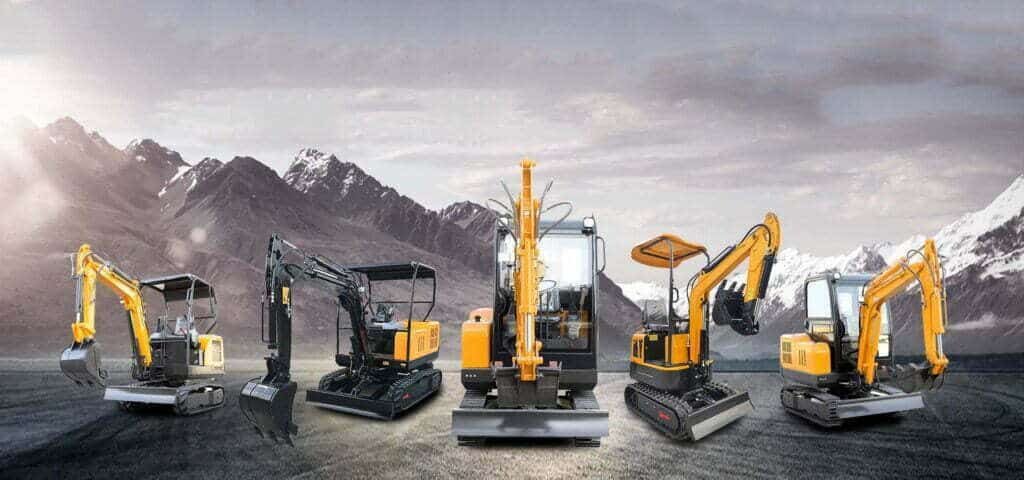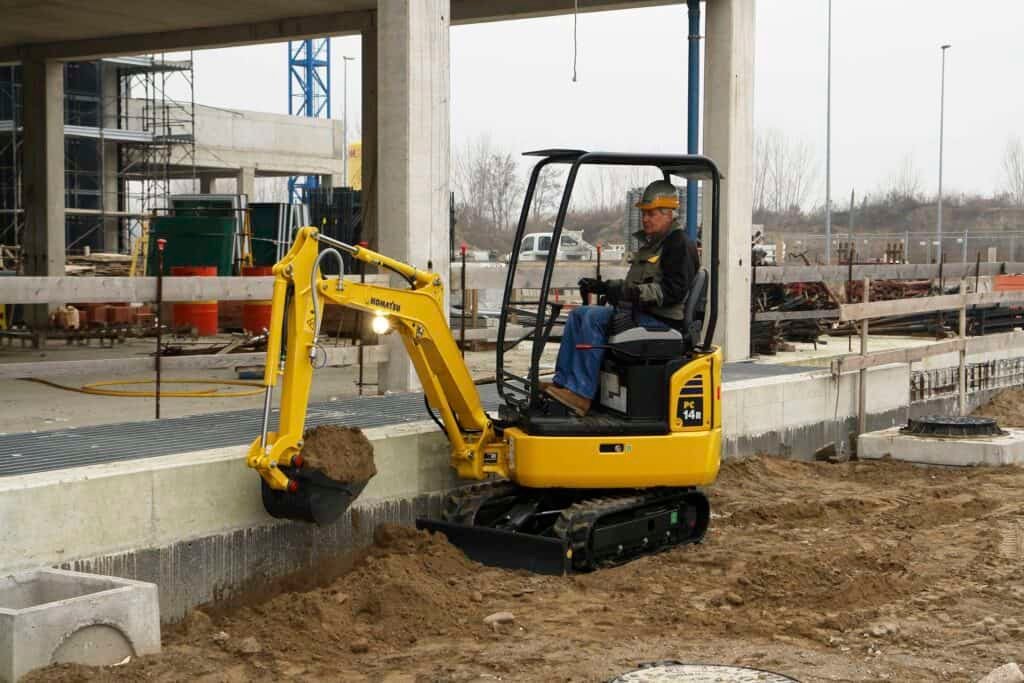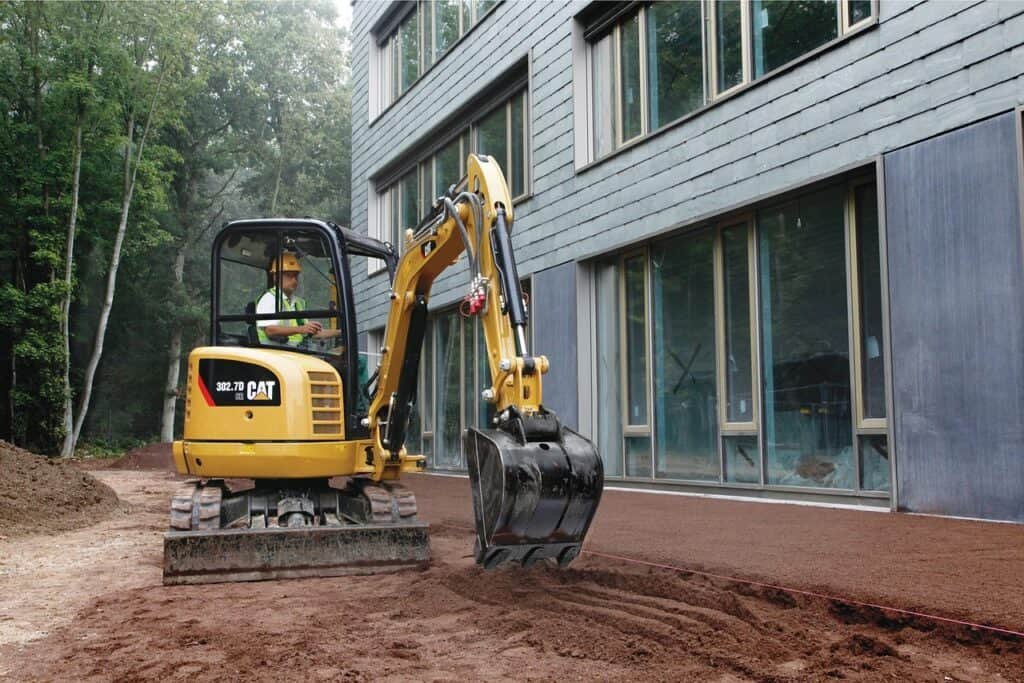Micro diggers are compact excavators that have become increasingly popular in the construction and landscaping industries. These machines are smaller than traditional excavators, making them ideal for working in tight spaces and on smaller projects. In this article, we’ll take a closer look at the key features and specifications of micro diggers, including their size, weight, and power.

Size Matters: How Micro Diggers Measure Up
One of the most significant advantages of micro diggers is their small size. These machines are typically less than 2 meters wide and 2 meters tall, making them easy to maneuver in tight spaces. They are also lighter than larger machines, which means they can be transported more easily and require less space for storage.
The compact size of micro diggers also makes them more versatile. They can be used for a wide range of tasks, from digging trenches and foundations to landscaping and demolition work. In addition, their small footprint means they can be used in urban areas where larger machines might not be practical.
However, there are some limitations to the size of micro diggers. Because they are smaller, they have a limited reach and digging depth. This means they may not be suitable for larger projects that require deeper excavations or longer reach.

Factors that Affect Size
The size of a micro digger is determined by several factors, including its weight, power, and digging capabilities. Some manufacturers also offer different sizes and configurations to suit different types of projects.
When choosing a micro digger, it’s important to consider the size of the job you’ll be working on. A machine that is too small may not be able to handle the workload, while a machine that is too large may be difficult to maneuver in tight spaces. It’s also important to consider the site conditions, including the terrain, access points, and obstacles that may need to be navigated.
Additionally, the size of a micro digger is also affected by its digging capabilities. The digging depth, reach, and bucket size can all affect the size of the machine. For example, a machine with a larger digging depth may require a larger size to accommodate the necessary hydraulic systems and attachments.
When selecting a micro digger, it’s crucial to consider the size of the job you’ll be working on. A machine that is too small may not be able to handle the workload and may result in longer project timelines and higher costs. Conversely, a machine that is too large may be difficult to maneuver in tight spaces, causing damage to the machine and the surrounding environment.
Site conditions must also be taken into consideration. For projects on uneven terrain, a larger machine with more stability may be required to prevent tipping. For projects in confined spaces, a smaller machine with better maneuverability may be necessary to navigate through tight spaces and around obstacles.
Ultimately, choosing the right size micro digger requires a thorough evaluation of the project requirements and site conditions. Some manufacturers offer different sizes and configurations to suit a variety of projects, but it’s important to work with a trusted supplier to ensure that the machine selected is appropriate for the job at hand. By choosing the right size micro digger, you can increase efficiency, reduce costs, and improve safety on your project.

Weight Matters: How Micro Diggers Maintain Stability
The weight of a micro digger is another important specification to consider. While these machines are lighter than traditional excavators, they still need to be stable to perform effectively and safely. The weight of a micro digger affects its center of gravity, which in turn affects its stability and ability to operate on uneven terrain.
A micro digger that is too light may tip over when working on sloping ground, while a machine that is too heavy may sink into soft soil. The weight of a micro digger also affects its ability to lift and move heavy loads, which is an important consideration when working with materials like concrete and steel.
The Weighty Issue: Factors that Affect the Weight of Micro Diggers
The weight of a micro digger is a crucial factor to consider when selecting the right machine for your project. It can affect the machine’s maneuverability, stability, and lifting capacity. When choosing a micro digger, it’s important to understand the factors that can affect its weight, including:
- Size – The size of a micro digger can impact its weight. Larger machines may require more materials and components, resulting in a heavier machine. Conversely, smaller machines may require fewer materials, resulting in a lighter machine.
- Power – The power of a micro digger’s engine can also impact its weight. More powerful engines may require larger components, resulting in a heavier machine.
- Configuration – The configuration of a micro digger can also affect its weight. Some models may be designed to be more lightweight for increased maneuverability, while others may be designed to be heavier for improved stability.
When selecting a micro digger, it’s important to consider the weight of the machine in relation to the job you’ll be working on. A machine that is too heavy may not be able to operate on soft or unstable ground, causing damage to the machine and the surrounding environment. On the other hand, a machine that is too light may not be able to lift or move heavy materials, resulting in longer project timelines and higher costs.
It’s essential to work with a trusted supplier to ensure that the micro digger selected is appropriate for the job at hand. They can provide expert advice on the best machine for your project, taking into account factors such as site conditions, terrain, and lifting requirements. By selecting the right weight micro digger, you can increase productivity, reduce costs, and improve safety on your project.

Power Up: How Micro Diggers Get the Job Done
The power of a micro digger is another important specification to consider. These machines are typically powered by diesel engines, although some models may use electric or hydraulic power. The power of a micro digger affects its digging capabilities, as well as its ability to move and lift heavy loads.
Micro diggers with more powerful engines are able to dig deeper and move heavier materials than those with less power. However, more powerful engines may also consume more fuel and produce more emissions, which can be a concern for some users.
The Powerful Punch: Factors that Affect the Power of Micro Diggers
Micro diggers are powerful machines that can handle a variety of tasks on construction sites, landscaping projects, and other applications. The power of a micro digger is a crucial factor to consider when selecting the right machine for your project. It can affect the machine’s digging depth, lifting capacity, and overall performance. When choosing a micro digger, it’s important to understand the factors that can affect its power, including:
- Size of the engine – The size of the engine is a critical factor that affects the power of a micro digger. Engines with a higher horsepower rating will typically provide more power to the machine, allowing it to tackle more challenging tasks.
- Type of power source – The type of power source can also impact the power of a micro digger. Some machines are powered by diesel engines, while others may use electric or gas-powered engines. Each type of engine has its own unique characteristics, and the power output can vary depending on the specific engine used.
- Hydraulic system – The hydraulic system is another factor that can impact the power of a micro digger. Machines with more advanced hydraulic systems may be able to generate more power, allowing them to operate more efficiently and handle heavier loads.
When selecting a micro digger, it’s important to consider the power requirements of the job you’ll be working on. A machine with insufficient power may not be able to dig deep enough or move heavy materials, resulting in longer project timelines and higher costs. On the other hand, a machine with too much power may be more expensive to operate and maintain.
Working with a trusted supplier is essential when selecting a micro digger with the appropriate power output for your project. They can provide expert advice on the best machine for your project, taking into account factors such as site conditions, terrain, and lifting requirements. By selecting the right power micro digger, you can increase productivity, reduce costs, and improve safety on your project.

Digging Deeper: Additional Features and Specifications of micro diggers to Consider
Aside from size, weight, and power, there are several other features and specifications to consider when choosing a micro digger for your project. Some of these include:
- Digging depth – the maximum depth that a machine can dig. This is an important consideration for projects that require deep excavation, such as foundation work.
- Reach – the maximum distance that a machine can extend its arm. This is important for projects that require reaching over obstacles or digging at an angle.
- Bucket size – the size of the bucket attachment that a machine uses for digging. This can affect the speed and efficiency of digging, as well as the amount of material that can be moved at once.
- Operating weight – the weight of the machine when fully loaded with fuel, fluids, and attachments. This is an important consideration for transport and storage.
- Fuel efficiency – the amount of fuel that a machine uses to complete a certain amount of work. This can affect operating costs and environmental impact.
- Noise level – the amount of noise that a machine produces during operation. This can be a concern for projects in residential areas or noise-sensitive environments.
Conclusion
When choosing a micro digger, it’s important to consider all of these features and specifications of micro digger to ensure that the machine is suitable for your project. It’s also important to consider the manufacturer’s reputation for quality and reliability, as well as the availability of parts and service support. By taking the time to choose the right machine for the job, you can ensure that your project is completed safely and efficiently. If you want to know more, please contact us for free.

